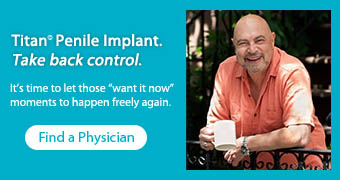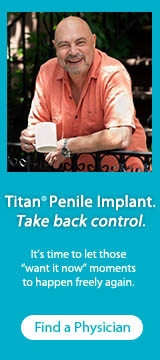As a - fairly - young man seriously considering an implant, I’ve had a bit of a shock tonight insomuch that I knew the risk increased with every revision / replacement but I did not know it was quite so high with the linked paper citing a 100% risk of infection by implant 5, which is just wild.
I don’t know why I’m asking a bunch of people on the internet and not trusting a peer-reviewed paper but damn, is this accurate?!
It’s sobering information for someone who will probably need at least 3-4 replacements in his life should he soon go for the implant.
https://pubmed.ncbi.nlm.nih.gov/29795529/
‘The risk of specific device infection was strongly correlated and increased based on number of prior IPPs: 1st (6.8%; 3/44), 2nd (18.2%; 4/22), 3rd (33.3%; 4/12), 4th (50%; 4/8), and 5th (100%; 2/2) (R2 = 0.90, p = 0.01).‘
‘The majority of patients referred for penile implant surgery can expect to have experienced at least one infection by their 4th device.’
Revision/Replacement Infection Risk Trajectory - Shocked
Revision/Replacement Infection Risk Trajectory - Shocked
37, mild to moderate ED since age 21, 3 Dopplers - 1 result VL & 3 later results 'no physical problem', dependent on cialis (efficacy now waning), overcame Lymophoma at age 26, ED causing immense/profound psychological distress. Considering implant.
Re: Revision/Replacement Infection Risk Trajectory - Shocked
The risk of infection with the first implant is said to be 6.8%?
Or should "1st" mean the first revision?
Or should "1st" mean the first revision?
Re: Revision/Replacement Infection Risk Trajectory - Shocked
Wizz93 wrote:The risk of infection with the first implant is said to be 6.8%?
Or should "1st" mean the first revision?
You would think 1st refers to the 1st revision but the statistic that the majority of implantees will get an infection by their 4th implant would seem to suggest that in this case, 1st refers to the the virgin implant.
Any way you look at it, these numbers are not the most encouraging set of data ever.
37, mild to moderate ED since age 21, 3 Dopplers - 1 result VL & 3 later results 'no physical problem', dependent on cialis (efficacy now waning), overcame Lymophoma at age 26, ED causing immense/profound psychological distress. Considering implant.
Re: Revision/Replacement Infection Risk Trajectory - Shocked
Not sure the study is as good as people are thinking. It starts with only 44 participants as I read it. Ends with 2. Published in fall of 2018. So did all of the participants get antibiotic treated implants? Was the one touch method used on each case? Was the common flushing of the area with antibiotic wash performed?
The severity of the infection isn't mentioned. Did a simple script of amoxicillin fix it? Or did it require a complete removal?
Honestly, in my opinion there doesn't appear to be enough data to judge the final numbers.
Edit: I even have issue with the first implant or revision. Common percentage is quoted in the 1-2% range.
The severity of the infection isn't mentioned. Did a simple script of amoxicillin fix it? Or did it require a complete removal?
Honestly, in my opinion there doesn't appear to be enough data to judge the final numbers.
Edit: I even have issue with the first implant or revision. Common percentage is quoted in the 1-2% range.
69yo, HBP @ 40, high triglycerides @ 45. Phimosis @ 57. Type 2 @ 60. Dr. William Brant May 1, 2023 CX 21cm w/no rte's penoscrotal 6" girth @ 6 months.
Re: Revision/Replacement Infection Risk Trajectory - Shocked
The thing about this paper is that there is not any information on the doctor(s) doing the revision. And the low number of cases that were used in this study. I mean 44 is a supper low number considering the number of implants being done.
That paper states that 28 doctors did the surgeries for those 44 men but did not give any information on the doctors or the volume of cases they did a year.
Not a publication I would think worth a lot. At best maybe a reason to find out who the surgeons were and avoid them.
That paper states that 28 doctors did the surgeries for those 44 men but did not give any information on the doctors or the volume of cases they did a year.
Not a publication I would think worth a lot. At best maybe a reason to find out who the surgeons were and avoid them.
Injections failed. Implanted 3-21-18 AMS 700 LGX 21 + 1 RTE 100 cc reservoir 6.5" L 5" G Dr. Kramer.
Proximal Perforation Sling Repair 4/13/21 Dr. Broghammer
67 years young.
Will show and tell and talk with others.
Proximal Perforation Sling Repair 4/13/21 Dr. Broghammer
67 years young.
Will show and tell and talk with others.
Re: Revision/Replacement Infection Risk Trajectory - Shocked
Yes, agree with what’s been said so far. Which is reassuring.
We always see here ‘go to high volume surgeons’ and it must of course be for this reason above all; to avail of the expertise of surgeons who are skilled at avoiding infection.
This is most likely a cross section of surgeons who don’t perform this procedure as much as the likes of the usual suspects.
We always see here ‘go to high volume surgeons’ and it must of course be for this reason above all; to avail of the expertise of surgeons who are skilled at avoiding infection.
This is most likely a cross section of surgeons who don’t perform this procedure as much as the likes of the usual suspects.
37, mild to moderate ED since age 21, 3 Dopplers - 1 result VL & 3 later results 'no physical problem', dependent on cialis (efficacy now waning), overcame Lymophoma at age 26, ED causing immense/profound psychological distress. Considering implant.
Re: Revision/Replacement Infection Risk Trajectory - Shocked
Edit: I think I misread and the infections were in fact before any surgery being done at Mayo Clinic. I’ve rewritten the post
High-volume surgeons are constrained by reality, they are not magicians. Antibiotic coatings decrease infection rates maybe 3-fold and their effectiveness depends on the specific microbe; again not magic. It takes a lot of trust to believe that a lone high-volume surgeon achieves revision infection rates 10-200 times lower than this sample (.5% claimed vs 6%-100% in this paper). That said I’m not ruling out that it could be true.
I don’t know how representative the numbers from the survey are and of course there are statistical biases, but I think it should be taken seriously.
High-volume surgeons are constrained by reality, they are not magicians. Antibiotic coatings decrease infection rates maybe 3-fold and their effectiveness depends on the specific microbe; again not magic. It takes a lot of trust to believe that a lone high-volume surgeon achieves revision infection rates 10-200 times lower than this sample (.5% claimed vs 6%-100% in this paper). That said I’m not ruling out that it could be true.
I don’t know how representative the numbers from the survey are and of course there are statistical biases, but I think it should be taken seriously.
Last edited by TwoStep on Tue Dec 28, 2021 12:46 am, edited 2 times in total.
Re: Revision/Replacement Infection Risk Trajectory - Shocked
Everybody needs to put this in perspective. During any given month we'll read about more implant sugeries than this study looked at. I dare say that in a whole year we'll read about maybe a couple of infections. Most are handled fairly easy by their surgeons. I can only think of 2 or 3 in my time that required removal & extensive work to cure. Yes, those few were far from pleasant but as a percentage. They don't mesh with this study. Not all studies are well thought out.
69yo, HBP @ 40, high triglycerides @ 45. Phimosis @ 57. Type 2 @ 60. Dr. William Brant May 1, 2023 CX 21cm w/no rte's penoscrotal 6" girth @ 6 months.
Re: Revision/Replacement Infection Risk Trajectory - Shocked
Gt1956 wrote:Everybody needs to put this in perspective. During any given month we'll read about more implant sugeries than this study looked at. I dare say that in a whole year we'll read about maybe a couple of infections. Most are handled fairly easy by their surgeons. I can only think of 2 or 3 in my time that required removal & extensive work to cure. Yes, those few were far from pleasant but as a percentage. They don't mesh with this study. Not all studies are well thought out.
When you say they’re handled easily, what do you mean by that?
That the implant is salvageable and a long lay off is avoided?
37, mild to moderate ED since age 21, 3 Dopplers - 1 result VL & 3 later results 'no physical problem', dependent on cialis (efficacy now waning), overcame Lymophoma at age 26, ED causing immense/profound psychological distress. Considering implant.
Re: Revision/Replacement Infection Risk Trajectory - Shocked
Well, two things come to mind:
The study does have very few cases. The first implant (first revision or first implant? Not clear to me...) group is 44 people. Already that is a very small sample group.
And then it just gets worse. Talking about a 50% risk on the 4:th (implant or revision?) when the population consists of 8 people is pretty useless.
On the other hand, infection is a real thing, it happens, and the maths does not work in favor of multiple surgeries.
Let us take a few examples of accumulated infection risk over 5 surgeries (not many would need more than 4 revisions) based on different risks on each surgery.
This will clearly show that if you pick a surgeon with poor skills on avoiding infection, probability of getting infected increases to pretty ugly numbers as number of surgeries go by.
Why the odd infection risk for the first surgery?
Because a study I read showed these infection risk by volume:
I put Eid in the table for reference. He publishes his infection risk data on his web page. Maybe there are other super skilled surgeons out there as well with similar records as him.
But the takeaway is - Eid (or someone with his skills) will have the same accumulated infection risk over 4-5 surgeries as the average doc has in one surgery.
I have got hammered over the years by some morons for giving one advice only in my signature and in plenty of posts - Choose a world class surgeon.
Many have said that there are plenty of fantastic surgeons in the local hillbilly hospitals. Yeah, right. Maybe there is.
But why take the risk? The odds are against you when you pick a low-volume surgeon, while the odds are definitely in your favor when you pick one of the very, very best.
Your choice, your dick.
The study does have very few cases. The first implant (first revision or first implant? Not clear to me...) group is 44 people. Already that is a very small sample group.
And then it just gets worse. Talking about a 50% risk on the 4:th (implant or revision?) when the population consists of 8 people is pretty useless.
On the other hand, infection is a real thing, it happens, and the maths does not work in favor of multiple surgeries.
Let us take a few examples of accumulated infection risk over 5 surgeries (not many would need more than 4 revisions) based on different risks on each surgery.
This will clearly show that if you pick a surgeon with poor skills on avoiding infection, probability of getting infected increases to pretty ugly numbers as number of surgeries go by.
Why the odd infection risk for the first surgery?
Because a study I read showed these infection risk by volume:
I put Eid in the table for reference. He publishes his infection risk data on his web page. Maybe there are other super skilled surgeons out there as well with similar records as him.
But the takeaway is - Eid (or someone with his skills) will have the same accumulated infection risk over 4-5 surgeries as the average doc has in one surgery.
I have got hammered over the years by some morons for giving one advice only in my signature and in plenty of posts - Choose a world class surgeon.
Many have said that there are plenty of fantastic surgeons in the local hillbilly hospitals. Yeah, right. Maybe there is.
But why take the risk? The odds are against you when you pick a low-volume surgeon, while the odds are definitely in your favor when you pick one of the very, very best.
Your choice, your dick.
43 yo, ED forever from VL
Fit and active
Implanted December 2015
Titan XL 24 cm, no RTEs
Dr. Eid
Activated day 13
Sex after 3 weeks
Gained length and girth
So far It works perfectly
Only one advice: Find a world class surgeon
Fit and active
Implanted December 2015
Titan XL 24 cm, no RTEs
Dr. Eid
Activated day 13
Sex after 3 weeks
Gained length and girth
So far It works perfectly
Only one advice: Find a world class surgeon
Who is online
Users browsing this forum: Google [Bot] and 15 guests







